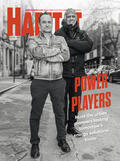HABITAT
Board Concerns When Potential Hires Won't Shake Hands with Opposite Sex
Megan Poonolly in Legal/Financial on February 28, 2014

A co-op board or condominium association interviews a highly qualified candidate for a newly posted position. At the conclusion of the group interview, the board members stand up to shake the candidate's hand. The candidate refuses to shake the hands of the female board members, stating that he does not engage in that practice. Although he does not mention his religion, the candidate's resume lists various religious organizations, leading the board to believe his objection is based on his religion. The board is troubled by this development and unsure whether the candidate's employment will cause issues [with female property managers, concierges and other building and management-company staff].
Segregation Now
Believe it or not, the above scenario is not unique. Indeed, as businesses around the world become more diverse and cultural, religious, social and business traditions collide, this and other similar issues continue to arise. For example, a martial arts studio in Canada recently came under fire for segregating its class by gender in order to accommodate one of its student's religious beliefs that a man must not touch an unrelated woman. Although the studio had good intentions in trying to accommodate one of its patrons, a young woman in the class claimed to be humiliated by the segregation. Ultimately, the business was left with a "no win" situation.
Like the Canadian martial arts school, the board in the above hypothetical scenario is faced with a Catch-22: If the company doesn't hire the candidate based on his handshaking beliefs, is it exposing itself to liability for religious discrimination? If the board does hire the candidate, does it open the door for a sex discrimination claim in the future?
What should the board do?
First and foremost, the board should move forward as it would in any other situation and continue evaluating all of the selected applicants to determine who is most qualified for the position. It may be that the candidate is not the most qualified, and further evaluation is unnecessary. Remember: just because you become aware of an applicant's protected class or need for potential accommodation does not mean that you must hire him or her over others. It merely means that you cannot discriminate on that basis. Be sure to evaluate all qualified applicants and do not put the cart before the horse.
Second, the board should not start digging into the candidate's social media and web presence to get more information about his religion. Doing so may create an inference of religious discrimination, and it could potentially reveal even more information–like national origin–that should not be considered.
Fact-Specific Inquiries
Finally, in the event that the candidate is the most qualified for the position, the board should examine his overall demeanor during the interview as it relates to women. Was he otherwise respectful of the women in the group? Or, did he display any sex-based animus? Also, the board should think about the candidate's potential role. Will he be a part of a team, or work solo? Will he fill a role where handshaking is expected as a part of business etiquette? The board should engage in this type of fact-specific inquiry to determine — absent any discussion or consideration of specific religious issues — whether the candidate's selective handshaking would cause any measurable negative impact on its workplace. In most situations, it's likely that it would not.
In the future, the board might consider an application process by which candidates are requested to omit personal information that may reflect racial, religious or national origin background. Doing so will remove even the appearance of improper consideration of such factors either before, during or after the interview process.
Megan H. Poonolly is an associate with Seyfarth Shaw and a member of the Labor & Employment Practice Group, who specializes in representing management in litigation regarding claims of discrimination, harassment and wage and hour violations. This is adapted from her article at Lexology.com.
For more, see our Site Map or join our Archive >>


